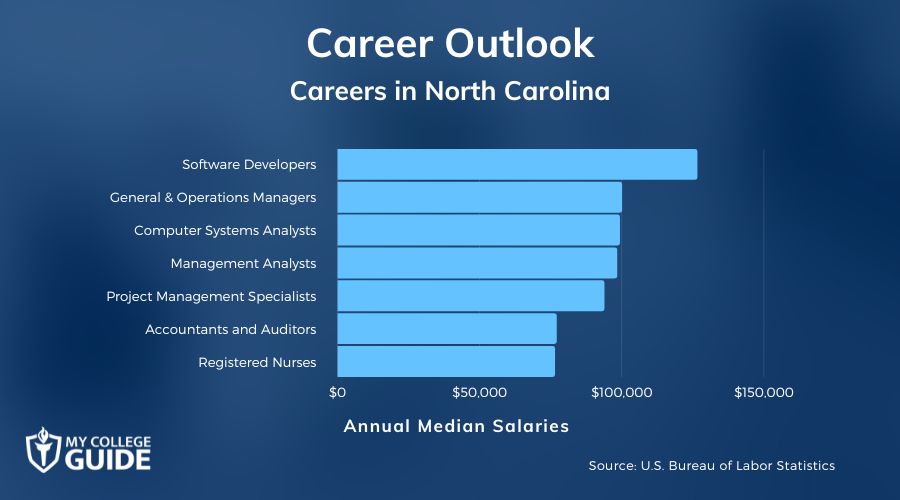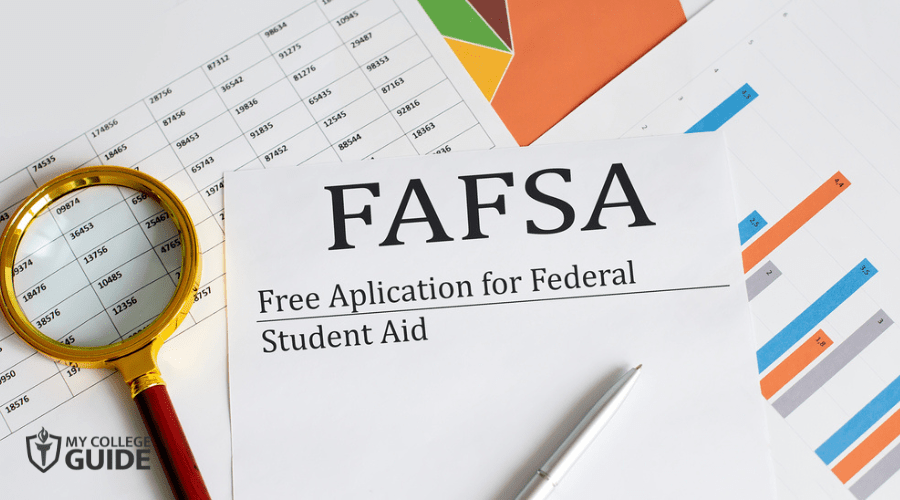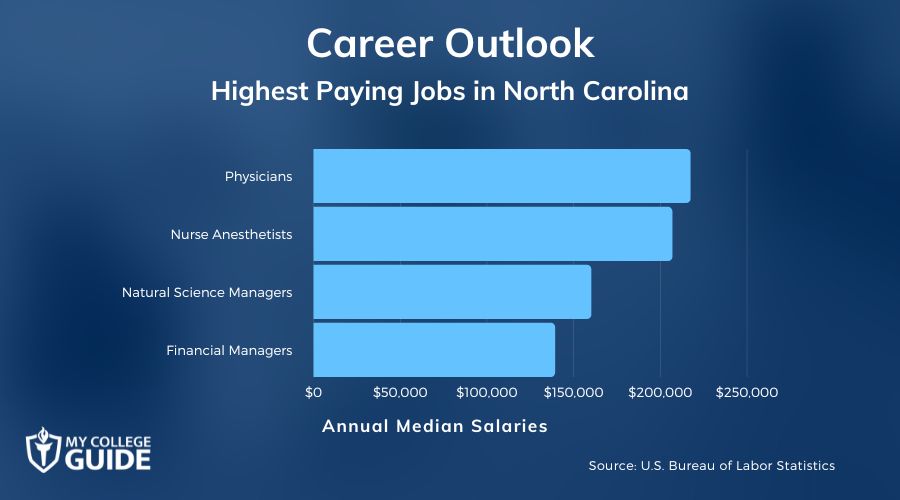The increase in online colleges in North Carolina shows that the state supports higher education. Leaders in education, business, and government have come together to establish MyFutureNC, a statewide nonprofit organization focused on educational attainment.

MyFutureNC has created a goal to ensure that 2 million North Carolinians have high-quality credentials or postsecondary degrees by the year 2030.
Editorial Listing ShortCode:
North Carolina currently offers quality schools and funding, so these efforts further demonstrate that the state values education and wants to provide the very best.
Online Colleges in North Carolina

According to the National Center for Education Statistics (NCES), nearly 31% of students in North Carolina are enrolled exclusively in online courses.
Almost another 32% are participating in a hybrid of online and on-campus courses. These numbers continue to rise as more and more schools introduce online learning programs.
Some colleges in the state of NC offer nearly 400 fully online degree and certificate programs. Various online fields of study offered include agriculture, behavioral science, business, criminal justice, education, engineering, information technology, liberal arts, medicine, health, nursing, and public administration.
Editorial Listing ShortCode:
Several of NC’s online college programs are supported by eLearning NC, a resource created by the North Carolina Education Cabinet and the Office of the Governor. ELearning NC is a one-stop-shop for online learning at the K-12, college, and even career levels.
Through the website, online learners can find out about courses and degree programs, financial aid, and additional support services available to them.
Similarly, the Virtual Learning Community (VLC) is a collaborative effort from various schools that provides course content and support services to students, educators, and administrators at the community college level.
Common Online Degrees in NC

Online universities in NC offer a variety of majors for eager learners. Some degree programs stand out as top contenders because they’re offered at many schools in the state or provide preparation for much-needed North Carolina roles.
These are some of the most common programs offered in the state and what they typically entail:
- Biology: Learning about living organisms and life processes can help prepare you to pursue a job in scientific research or healthcare.
- Business Administration: This popular undergraduate degree explores concepts in finance, management, and information technology to prepare for jobs in business organizations.
- Computer Science: Earning this degree involves studying computers and the principles by which they operate, which can help you pursue in-demand tech careers.
- Elementary Education: This degree is typically pursued in order to prepare for licensure and a career educating young learners.
- Nursing: North Carolina residents depend on trained registered nurses. Earning a Bachelor of Science in Nursing can allow you to pursue this in-demand and much-needed career.
Other popular degrees available from online schools in this state include psychology, communications, and accounting.
Overview of Higher Education in North Carolina

There are 132 degree-granting institutions in North Carolina, according to the NCES. Of those, 75 are public schools, 48 are non-profit private schools, and 9 are for-profit private schools. These numbers include NC community colleges online as well.
According to the NCES, the average cost of tuition and fees to attend one of the state’s 4 year public institutions is $7,260 a year. Out-of-state students pay around $23,136, which is also well below the national average.
Those looking to earn NC online degrees may also benefit from the state’s involvement in the Southern Regional Education Board (SREB), which encourages resource sharing among the 16 participating states.
Editorial Listing ShortCode:
Through this program, qualifying North Carolina students can enroll in out-of-state programs in nearby states while paying in-state rates.
Employment Outlook for College Graduates in North Carolina

If you’re thinking about going back to college in NC, you’re probably wondering whether having a degree will be worth it. Taking a look at job data from the Bureau of Labor Statistics (BLS) can help you learn more about your career prospects after graduation.
According to the BLS, approximately 4.6 million people are employed in North Carolina. The state’s unemployment rate is around 3.4%, which is close to the unemployment rate for the US as a whole.
Several employment sectors in North Carolina are experiencing notable year-over-year job growth. Some of these sectors are leisure and hospitality, information, education, healthcare, business services, finance, and construction.
Careers & Salaries in North Carolina

If you’re interested in pursuing a career with many NC job opportunities, you can take a look at professions that employ a lot of residents. Jobs that require college degrees often pay higher wages, so you may want to look into them as well.
If you enjoy young people, you might think about becoming a teacher. The North Carolina school district employs many teachers for students of all ages.
Another way to make a difference for others is to launch a career in healthcare. Nursing is one of the largest healthcare job categories in North Carolina.
This state also has a robust tech sector. Studying computers and technology could allow you to pursue a career as a systems analyst or a software developer.
Editorial Listing ShortCode:
Of course, there are many opportunities in finance and business too. You could pursue a career as a business specialist in a department such as accounting, marketing, or human resources. You might also pursue opportunities in consulting or management.
According to the Bureau of Labor Statistics, North Carolina workers make a median annual salary of $41,810. Careers requiring a college education, such as those listed below, often bring in higher earnings.
| Careers | Annual Median Salaries |
| Software Developers | $126,530 |
| General and Operations Managers | $100,030 |
| Computer Systems Analysts | $99,280 |
| Management Analysts | $98,320 |
| Project Management Specialists | $93,830 |
| Accountants and Auditors | $77,040 |
| Registered Nurses | $76,440 |
| Business Operations Specialists | $67,120 |
| Market Research Analysts and Marketing Specialists | $65,710 |
| Human Resources Specialists | $61,670 |
North Carolina also offers job opportunities in criminal justice, manufacturing, human services, and a variety of other fields.
These are just some of the careers available in NC. Your specific salary potential will depend on a number of factors, including your location, employer, work experience, and education.
Online North Carolina Colleges Admissions Requirements

As you look at schools for your online bachelor’s degree in NC, it is important to pay attention to the admission requirements at each institution because specific requirements vary from school to school.
While there may be some differences, there are some common requirements you are likely to see. The colleges you’re considering are likely to ask for the following admissions materials:
- ACT or SAT scores (only a requirement at some schools)
- An essay or personal statement
- High school transcripts or GED certificate
- Recommendation letters from teachers or work supervisors
Additionally, some colleges may have you take placement tests during the admissions process.
NC Online Colleges Accreditation

When looking at NC colleges online, it’s beneficial to consider the ones that hold regional accreditation. Those are the schools that you’ll likely want to include on your shortlist since regional accreditation is widely acknowledged as a mark of quality.
Editorial Listing ShortCode:
Regional accreditation is useful for anyone transferring credits between colleges or applying to grad school. It may also be necessary when applying for professional licensure or getting a job that requires a college education.
The regional accrediting agency that typically reviews and approves North Carolina colleges is the Southern Association of Colleges and Schools Commission on Colleges (SACSCOC).
Financial Aid and Scholarships

The state and federal governments give away millions of dollars yearly to help students pay for North Carolina online colleges.
In order to access these funds, you’ll need to fill out the Free Application for Federal Student Aid (FAFSA). The information provided in this application is used to determine the types and amount of financial aid you qualify for.
As a North Carolina resident, when you submit your FAFSA, it will also check your eligibility for the following state-funded student aid programs:
- NC Education Lottery Scholarship: This is for undergraduates taking at least six credit hours at UNC or a community college. It is an income-based scholarship, but applicants must also meet the academic requirements of the institution.
- NC Community College Grant: This program is intended for community college students taking at least six credit hours. It is income-based, but students must also meet the academic requirements of the institution.
- UNC Need-Based Grant: This is for students taking at least six credit hours at one of the 16 UNC system campuses, and it is income based.
- NC Need-Based Scholarship: This program is for undergraduates taking at least nine credit hours, and it is need-based.
North Carolina colleges and universities online may have their own additional grant and scholarship programs. To find out how to apply for these, you can contact the financial aid office at the school you’re interested in.
You can also apply for private scholarships. These may be awarded based on need, merit, or other special circumstances, such as race, religion, region, athletic or artistic abilities, unique talents, intended major, and so on.
These are some scholarships students in North Carolina may apply for:
- Crumley Roberts Next Step Scholarship Foundation: Varies
- Golden LEAF Scholarship Program: $3,000 per year
- NC Sheriffs Association Undergraduate Criminal Justice Scholarships $2,000
- SEANC Scholarships: Varies
- The Dottie Martin Teachers Scholarship: $500
North Carolina Online Education Resources

North Carolina offers robust online resources to support college students. These are some you may want to check out:
- College Foundation of North Carolina: As you plan your future career, start the college application process, and look into financial aid, you may appreciate the help that can be gained from CFNC’s free online resources.
- NC Live: This cooperative program connects libraries across the state, and you may find its online databases helpful as you complete your college assignments.
- Virtual Learning Community: On this website from the North Carolina Community College System (NCCCS), you can learn about online community college courses available in this state.
These organizations can help you fulfill your dream of earning a college degree.
How Much Does It Cost to Go to an Online College in North Carolina?

Tuition information from the National Center for Education Statistics will help you know what to expect in terms of college costs.
The average tuition for private colleges in North Carolina is $36,772 a year. Generally, 4 year public universities are more affordable. The annual tuition rate is, on average, $7,260 for in-state students and $23,136 for out-of-state students.
The lowest rates are offered by 2 year community colleges. On average, in-state students pay $2,474 annually, and out-of-state students pay $8,511.
Editorial Listing ShortCode:
One advantage of online classes is that many students don’t end up paying room and board costs on top of these tuition fees.
Tuition Breaks for Out-of-State Students

The state of North Carolina does not currently participate in any tuition reciprocity programs with other states. Even still, there may be select opportunities for you to receive in-state tuition as a student who lives in another state. Some colleges have special tuition waivers that they offer to select students.
You may need to request this waiver and go through a selection process to qualify. If you’re curious about this option, you can ask an admissions counselor whether there may be any out-of-state tuition breaks available to you.
What Jobs Are in High Demand in North Carolina?

As you look at online degrees in North Carolina, you may wish to pay attention to which jobs are most in demand. The North Carolina Department of Commerce predicts top job growth for the following careers, each of which typically requires an undergraduate college education.
- Information security analysts: 3.1% growth
- Software developers: 2.6% growth
- Operations research analysts: 2.4% growth
- Market research analysts: 2.2% growth
These growth estimates are based on projected increases over the next decade.
What Are the Highest Paying Jobs in North Carolina?

Perhaps you’re hoping that after attending one of the best colleges in North Carolina online, you’ll be on your way to a lucrative career. If so, you may want to consider what the Bureau of Labor Statistics says are some of the top-paying jobs in this state.
On average, physicians make $217,190 annually. Nurse anesthetists have an average salary of $206,750. Outside of healthcare, natural science management is typically a lucrative career track. Such professionals have an average annual salary of $159,990. Also, financial managers have an average yearly salary of $139,150.
Editorial Listing ShortCode:
Wages vary based on location, education, and experience, and some high-paying jobs specifically require graduate degrees.
List of Online Colleges in North Carolina
Methodology: The following school list is in alphabetical order. To be included, a college or university must be regionally accredited and offer degree programs online or in a hybrid format.

Appalachian State University offers a wide range of certificate, undergraduate, master’s, and doctoral programs that can be completed entirely online. The school’s distance learning courses are taught by the same expert instructors as its on-campus classes.
Fields of study offered include nutrition, communication, veterinary technology, educational leadership, social work, mathematics, and health administration.
Appalachian State University is accredited by the Commission on Colleges of the Southern Association of Colleges and Schools.

Barton College’s Office of Graduate and Professional Studies offers a variety of online certificate and degree programs. Potential subjects available in online formats include healthcare, information technology, justice, and nursing.
Some classes are offered 100% online, while others utilize a hybrid in-person and distance learning model.
Barton College is accredited by the Southern Association of Colleges and Schools Commission on Colleges.

Duke University offers online options from professional certificate programs to doctoral degree programs. Students interested in attending this top-ranked research institution may now do so with the convenience of distance learning.
The school has diverse online offerings, including a Master of National Security Policy, an Artificial Intelligence Certificate, a Doctor of Ministry, and more.
Duke University is accredited by the Southern Association of Colleges and Schools Commission on Colleges.

East Carolina University may be an excellent fit for students who want to take the next step in their education but require the flexibility of online learning. The school offers studies in business, healthcare, education, technology, and more.
Online programs are taught by the same instructors as their on-campus counterparts and require the same prerequisites.
East Carolina University is accredited by the Southern Association of Colleges and Schools Commission on Colleges.

Fayetteville State University offers 10 programs that aim to combine the typical quality of traditional learning models with the convenience of virtual attendance options. Some subjects offered in this format include accounting, computer science, and nursing.
Students wanting to take advantage of the university’s distance learning model may take at least 75% of their upper-division courses online.
Fayetteville State University is accredited by the Southern Association of Colleges and Schools Commission on Colleges.

Gardner-Webb University offers a wide array of courses and programs that utilize flexible virtual class models. There are online learning options at all levels, including undergraduate certificates, majors, and minors, as well as master’s and doctoral degree programs.
Time to completion varies based on specific discipline and program level.
Gardner-Webb University is accredited by the Southern Association of Colleges and Schools Commission on Colleges.

Mid-Atlantic Christian University blends rigorous coursework with a uniquely biblical perspective in an effort to educate future innovators and leaders. The university offers several programs 100% online in an effort to provide students with additional flexibility.
Potential distance learning programs include a Bachelor’s in Biblical Studies, a Bachelor’s in Organizational Leadership, and a Bachelor’s in Family Studies.
Mid-Atlantic Christian University is accredited by the Southern Association of Colleges and Schools Commission on Colleges.

North Carolina Agricultural and Technical State University offers over 20 fully online certificate, bachelor’s, master’s, and doctoral level programs fully online. Available topics of study include occupational safety, education, information technology, and nursing.
Students attending classes online have access to the same technical support, counseling, and resources as traditional campus-based students.
North Carolina Agricultural and Technical State University is accredited by the Southern Association of Colleges and Schools Commission on Colleges.

North Carolina Central University aims to blend top-ranked curriculums with the convenience of distance learning models. Some classes meet asynchronously online, though most require virtual attendance as outlined by the instructor.
The university offers online options across all academic levels to help ensure flexibility for students regardless of where they are in their educational journeys.
North Carolina Central University is accredited by the Southern Association of Colleges and Schools Commission on Colleges.

North Carolina State University utilizes online learning to meet its goal of making education accessible to as many students as possible. Over 120 degree and certificate programs are available in this convenient format.
Students interested in subjects like engineering, agricultural studies, educational counseling, and textiles may be able to attend classes 100% online.
North Carolina State University is accredited by the Southern Association of Colleges and Schools Commission on Colleges.

Pfeiffer University emphasizes equally the importance of academic, relational, and spiritual life. To support that balance, many of the school’s programs can now be attended via flexible, hybrid learning models.
Students who want to regain control over their schedules and progress at their own pace may find an ideal fit in the university’s online offerings.
Pfeiffer University is accredited by the Southern Association of Colleges and Schools Commission on Colleges.

Queens University of Charlotte offers 28 undergraduate and graduate degree and certificate programs that can be completed 100% online. Some potential subjects offered online include nursing, global business, cybersecurity, and strategic communications.
Across all programs, the university seeks to educate students with a blend of liberal arts core, theoretical knowledge, and hands-on career preparation.
The Queens University of Charlotte is accredited by the Southern Association of Colleges and Schools Commission on Colleges.

The University of Mount Olive utilizes online course delivery to accommodate the scheduling needs of students from a variety of backgrounds. Distance learning options are available across education levels and topics of study.
Within online and traditional programs, the university emphasizes personalized, values-based learning in the liberal arts tradition.
The University of Mount Olive is accredited by the Southern Association of Colleges and Schools Commission on Colleges.

The University of North Carolina—Chapel Hill aims to provide students, regardless of their location or academic goals, with programs and learning modalities to meet their needs.
The university offers online learning opportunities for both degree and non-degree certificate programs. Potential topics of study include healthcare leadership, public administration, library science, marketing, and social work.
The University of North Carolina at Chapel Hill is accredited by the Southern Association of Colleges and Schools Commission on Colleges.

The University of North Carolina—Charlotte’s distance education programs are designed to help accommodate the busy schedules of working adults. Most meet fully online, while some offer site-based locations throughout North Carolina.
The Colleges of Computing and Informatics, Education, Engineering, Health and Human Services, and Liberal Arts all offer undergraduate and graduate online learning options.
The University of North Caroline at Charlotte is accredited by the Southern Association of Colleges and Schools Commission on Colleges.

The University of North Carolina—Greensboro’s online learning programs blend the flexibility of distance education with academic quality and a focus on valuable career development.
Online attendance is an option for many undergraduate and graduate programs. Subjects available include business administration, human development, public health, global studies, and music education.
The University of North Carolina at Greensboro is accredited by the Southern Association of Colleges and Schools Commission on Colleges.

The University of North Carolina—Wilmington offers undergraduate and graduate degree and certificate programs online. The instructors and curriculums for these distance education courses are the same as their on-campus counterparts.
Online classes meet in three formats: fully online with synchronous or asynchronous attendance, hybrid online and in-person, or fully in-person at remote locations off-campus.
The University of North Carolina at Wilmington is accredited by the Southern Association of Colleges and Schools Commission on Colleges.

Wake Forest University is a liberal arts university that boasts small class sizes, rigorous education, and a cutting-edge research focus.
Several graduate degrees at the university can be completed 100% online. Potential programs include a Doctor of Nursing Practice, a Master of Arts in Counseling, and a Master of Project Management.
Wake Forest University is accredited by the Southern Association of Colleges and Schools Commission on Colleges.

Western Carolina University offers distance education opportunities for undergraduate, graduate, and certificate programs. Students wanting to take the next step in their education while honoring existing commitments may find an ideal fit in an online program.
While these programs meet primarily online, students who are preparing for certification or licensure should anticipate occasional in-person commitments.
Western Carolina University is accredited by the Southern Association of Colleges and Schools Commission on Colleges.

Winston-Salem State University offers 9 online undergraduate and graduate programs. These distance learning programs provide flexibility in location and pacing designed to accommodate even the busiest students.
Bachelor’s programs are offered in clinical laboratory science, nursing, education, and interdisciplinary studies. Master’s and doctoral programs cover subjects like healthcare administration, rehabilitation counseling, nursing education, and physical therapy.
Winston-Salem State University is accredited by the Southern Association of Colleges and Schools Commission on Colleges.
Getting Your Online Degree in North Carolina

With an impressive variety of schools to choose from, some of the lowest tuition rates in the nation, and generous financial aid funding, North Carolina has much to offer for many. The state continues to set new goals, demonstrating its commitment to providing the very best in higher education.
If you’re ready to start your educational journey, you can begin researching accredited online universities in North Carolina that offer your desired degree program.
You can also view our Online Colleges in New York and Online Colleges in North Dakota guides for more options.
